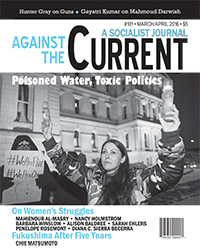Against the Current, No. 181, March/April 2016
-
An Extraordinary Moment
— The Editors -
Making Race Disappear
— Malik Miah -
Hip-Hop Ain't Dead
— Alice Ragland -
Our Guns, Our Rights
— Hunter Gray -
Florida Today: "Worse Than Mississippi"
— Paul Ortiz -
Fukushima After Five Years
— Chie Matsumoto - China: Slowdown and Crackdown
- Women in the Struggle
-
Lessons of the Egyptian Struggle
— Mahienour al-Masry -
Rosa Luxemburg for Our Time
— Nancy Holmstrom -
Women's Monumental Struggle
— Barbara Winslow -
Thinking About Suffragette
— Alison Baldree -
Reading & Returning to Denise Levertov
— Sarah Ehlers -
Women of Dada and Their Times
— Penelope Rosemont -
Salvadoran Women Combatants
— Diana C. Sierra Becerra - Crisis and Apartheid in Israel/Palestine
-
Jerusalem: Colonized City
— an interview with Thomas Abowd -
Mahmoud Darwish, A Poet's Complex Trajectory
— Gayatri Kumar - Reviews
-
Raising Hell for Labor
— Steve Downs -
A Word Warrior for Freedom
— John Woodford -
Long Distance High Tech State Terror
— David Richardson -
Towards Workers' Climate Action
— Traven Leyshon -
The Promise of A Revolution
— William Smaldone - In Memoriam
-
Ellen Meiksins Wood (1942-2016)
— Robert Brenner
Alison Baldree
SUFFRAGETTE FOCUSES ON rank-and-file women rather than on the leadership of the suffragette movement — a perspective not often told. Though women won the right to vote, many of the oppressive conditions facing working-class women remain.
Slowly the layers of Maud’s life are peeled back as we see her becoming more aware of the political system. Having the right to vote would provide an opportunity for change. She sees the suffragette movement as a way to fight for a better future.
Suffragette portrays scenes in Maud’s home and work life. In a moment of reflection she asks her husband what he thinks life would have been like if they had a daughter, not a son. He dismisses Maud, leaving her to think about the would-be future of a daughter.
Maud has a suffocating work experience and sees other young women experience the sexual harassment that she has probably experienced. But she has little personal power to improve her working conditions because her livelihood depends on the meager income; her options are slim. Each worker is acting as an individual agent rather than as a united force.
As she meets suffragettes, she finds them repeatedly dismissed by men in power. But immersed in collective action, she also sees and feels the power of the mass movement. Her sense of solidarity with the other suffragettes grows. She realizes that the movement it is not just about her own future, but the future of all women. She starts to take more risks.
Three months after Maud gives testimony to cabinet minister Lloyd George, who appears visibly moved, the suffragettes wait outside parliament to hear if the law was passed. To everyone’s surprise, it was not.
The crowd, after an initial moment of shock, begins to shout at the minister. The police surround and attack them, grabbing and hitting women with batons as they attempt to shield themselves. Several are arrested. But only those with powerful and wealthy husbands are able to make bail. The film subtly shows power and class relations within and surrounding the movement.
All these power relations exist today, and I’m not talking only about police brutality. Working-class women still make less than men and many of us are the primary/sole caretakers of children. We are subject to the will of our employers. Part-time, temporary or contracted work leaves many underemployed, overworked and underpaid. Domestic workers and wait staff — and many salaried workers as well — are excluded from minimum wage, overtime regulations, and other rights and protections.
And all too often, as in the film, not only do bosses harass women employees, but husbands and boyfriends abuse women. Maud’s husband throws her out of the house for her continued political activity and she loses her son.
A Limited Victory
After working through the channels of the political system and seeing them fail, the suffragettes, inspired by a speech from political activist Emmeline Pankhurst, develop a protest strategy to damage private property. Although they win in the end, women like Maud are forced to pay a very high price.
Maud joined the suffragette movement because she saw how the laws were not working for her. She wanted an alternative. While electoral politics is a place where struggle can take place, having the right to vote does not bring about the depth of transformation we desire.
Although it portrays a moving and historical moment, Suffragette simply ends with a rolling list of dates when women won the right to vote in various nations. Granted, it’s not a documentary, but somehow the failure to deal with power relations left me dissatisfied. After all, democracy under capitalism is subject to its varied tools: racism, classism, sexism, homophobia and other forms of oppression.
Yes women — through collective action, perseverance and solidarity — won the right to vote. But changing the relationships of power and class is a much larger battle. We can see this reflected in the political response to the Black Lives Matter movement, policies restricting who can vote through voter ID laws and in our everyday experience.
For me, the most significant lesson from Suffragette is the importance of building solidarity and the power of mass movement. It’s only when we work together in a collaborative way against all forms of oppression that we can abolish the fundamental system, capitalism, that oppresses us all. Suffragette helped me meditate on the many, many tasks left undone.
March-April 2016, ATC 181

